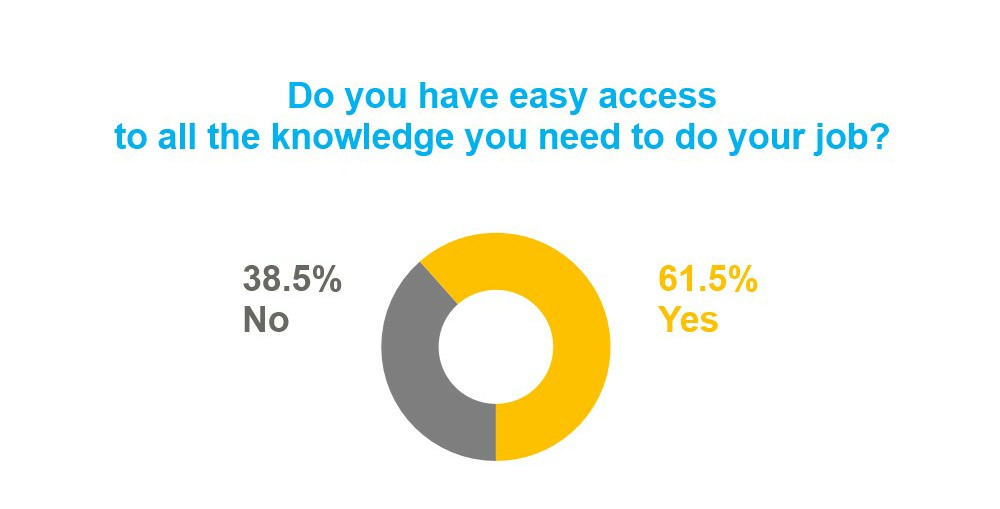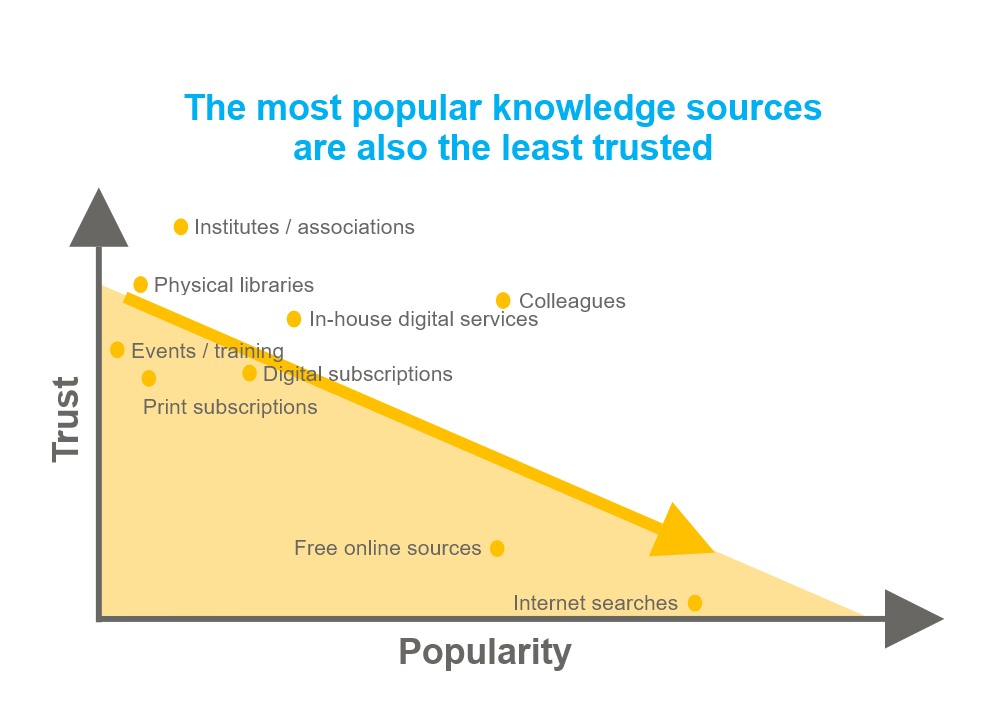Construction Knowledge Task Group survey
A third of practitioners do not have easy access to the knowledge they need.
This is the startling finding of a survey carried out by the Construction Knowledge Task Group.
299 practitioners from every part of the industry took part in the survey. 38.5% said they did not have easy access to all the knowledge they need to do their job. This begs the question, what are they doing without, and how critical is it?

|
Practitioners also admitted they use less-trusted knowledge sources more frequently than more-trusted knowledge sources, with web searches and free online resources accounting for almost half of all the knowledge accessed.

|
Other key findings include:
- Cost and sign-up forms are significant barriers to accessing knowledge, particularly for SMEs.
- Practitioners are unaware of much of the knowledge that is available, they are overwhelmed by how much knowledge there is and frustrated by how fragmented it is.
- There is a ‘them and us’ culture separating those in the knowledge loop from those stuck on the outside.
- There is a need for quick and straightforward access to knowledge on demand.
The survey also revealed that designers access industry knowledge up to four times more frequently than decision makers such as clients and project managers, and that the most frequently-accessed knowledge is practical, specific guidance that supports day-to-day activities. Less specific, traditional ‘learning’ material is not as popular.
The purpose of the survey, which ran at the end of 2018, was to help the Construction Knowledge Task Group steer its work, improving the way industry knowledge is prepared, accessed and applied. It was distributed to the membership and other networks of the organisations that form the Task Group.
Ann Bentley, Global Board Director at Rider Levett Bucknall, and Member of the Construction Leadership Council said:
| “The results of this survey confirm what I suspected, and should be a wake-up call for the industry. Practitioners have embraced the internet and are seeking out easy-to-access, easy-to-apply knowledge. The industry needs to make sure they find what they are looking for. This means bringing knowledge into 21st century and taking a more collaborative and systematic approach to how it is prepared and shared. BIM has shown how this can be done for data and information, but knowledge is still stuck in the past." |
Convenor of the Task Group, architect Dr Gregor Harvie said:
| “Construction is a knowledge-based industry. Knowledge helps spread best practice, promote innovation and prevent mistakes. But this important survey reveals that all too often practitioners are unaware of what is available, or they do not have easy access to it. As a result, knowledge has less impact on the ground than it should.” |
The survey suggests the future should be one in which knowledge is better integrated, less siloed, more easy-to-access and available through flexible subscriptions and intelligent search tools.
The Task Group will meet in January to discuss how to drive this agenda forward.
You can see the survey results in full at: https://www.designingbuildings.co.uk/Construction_knowledge_survey_results
Notes
The Construction Knowledge Task Group (CKTG) was established in 2018 to make it as easy as possible for practitioners and other industry stakeholders to find, access and apply the right knowledge at the right time.
Its members include representatives from; the Construction Leadership Council, CIOB, ICE, RIBA, RICS, i3P, BSRIA, CIAT, CIBSE, UKGBC, BRE, Arup, Rider Levett Bucknall, University of Dundee, Polypipe, Constructing Excellence, The Get It Right Initiative, Cundall, Designing Buildings Wiki, AEC3 UK, Invennt and Stroma.
You can find out more about the Construction Knowledge Task Group at: https://www.designingbuildings.co.uk/Construction_knowledge_task_group
Featured articles and news
A case study and a warning to would-be developers
Creating four dwellings... after half a century of doing this job, why, oh why, is it so difficult?
Reform of the fire engineering profession
Fire Engineers Advisory Panel: Authoritative Statement, reactions and next steps.
Restoration and renewal of the Palace of Westminster
A complex project of cultural significance from full decant to EMI, opportunities and a potential a way forward.
Apprenticeships and the responsibility we share
Perspectives from the CIOB President as National Apprentice Week comes to a close.
The first line of defence against rain, wind and snow.
Building Safety recap January, 2026
What we missed at the end of last year, and at the start of this...
National Apprenticeship Week 2026, 9-15 Feb
Shining a light on the positive impacts for businesses, their apprentices and the wider economy alike.
Applications and benefits of acoustic flooring
From commercial to retail.
From solid to sprung and ribbed to raised.
Strengthening industry collaboration in Hong Kong
Hong Kong Institute of Construction and The Chartered Institute of Building sign Memorandum of Understanding.
A detailed description from the experts at Cornish Lime.
IHBC planning for growth with corporate plan development
Grow with the Institute by volunteering and CP25 consultation.
Connecting ambition and action for designers and specifiers.
Electrical skills gap deepens as apprenticeship starts fall despite surging demand says ECA.
Built environment bodies deepen joint action on EDI
B.E.Inclusive initiative agree next phase of joint equity, diversity and inclusion (EDI) action plan.
Recognising culture as key to sustainable economic growth
Creative UK Provocation paper: Culture as Growth Infrastructure.





















